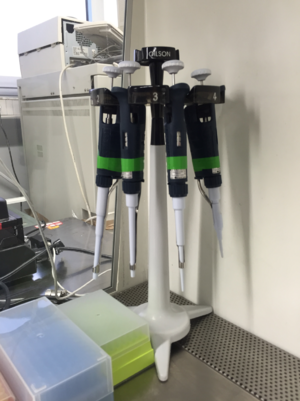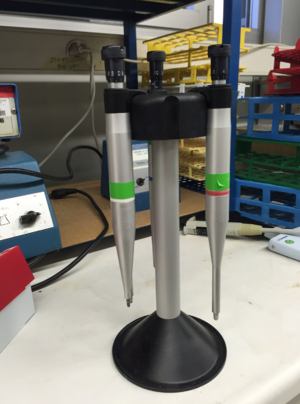Difference between revisions of "Instru Pipettes"
Jump to navigation
Jump to search
| (One intermediate revision by the same user not shown) | |||
| Line 7: | Line 7: | ||
They mostly have the same functioning mechanism but some have some specificities (ex: Micronic). | They mostly have the same functioning mechanism but some have some specificities (ex: Micronic). | ||
| − | [[File: | + | [[File:gibson1.png|300px|thumb|left|Gilson Pipette]] |
| − | [[File:pipette1.png|300px|thumb| | + | [[File:pipette1.png|300px|thumb|middle|Micronic Pipettes]] |
=== Functions === | === Functions === | ||
Latest revision as of 20:43, 8 July 2015
Introduction
Pipettes are one of the most important tool of the biologist. They allow to handle very precise amounts of liquids from 0.2ul to 1ml for the most common ones. They are separated in classes most usually 4 types ranging from 0.2ul to 2ul, 2ul to 20ul, 20ul to 200ul and finally 200ul to 1ml.
Our models
We possess several types of pipettes from different brands: Gilson, Eppendorf, Micronic, Socorex etc... They mostly have the same functioning mechanism but some have some specificities (ex: Micronic).
Functions
This great tutorial from bio-outils explains in great details how to handle pipettes correctly. pipett tutorial In the case of Micronic pipettes you have to remove the pipette head and set the volume on it and fix it back on the pipette body.
Rules
- 1) Just don't drop them and suck highly concentrated acid or basic solutions.

